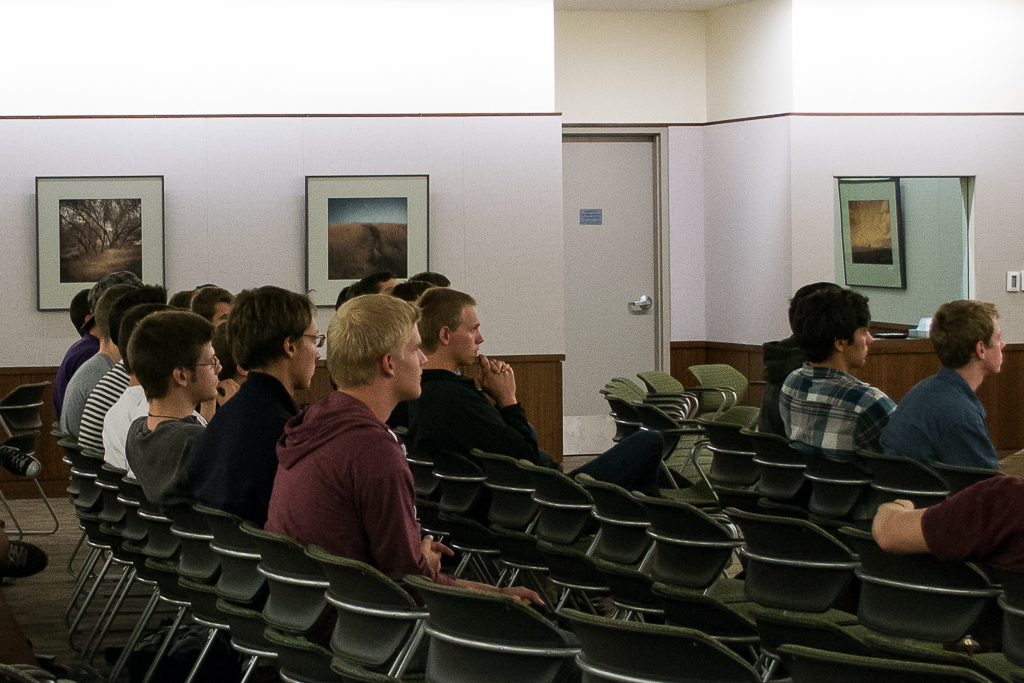
What is manliness? What does it look like to be a Christian man in today’s society? Answering these questions is the main goal of the Call to Manhood chapel series. However, despite the intentionality, community and spiritual development that has occurred in the program over the past three years, it is no longer going to be awarded chapel credit.
This series, at its core, is community based and stands to promote growth within the Biola community. Not only do students come together in fellowship, but every panel consists of multiple men, each emphasizing different aspects of a featured subject.
Matthew Hooper, associate dean of students, said, “At the heart of this ministry are three principles: being anchored in truth, awareness of what goes on in the hearts of men, and actively living out the call of manhood.” The team in charge of this alternative chapel is composed of Student Development staff as well as students that have shown leadership abilities.
“[It is the desire of the staff for men to] hear the call, reflect on the call, discuss the call, and finally act on it,” Hooper said.
The ongoing series targets real issues concerning manhood: masculinity, friendship, sexuality, responsibility, faith, service and — coming shortly — deceit. Each meeting is intentionally crafted to make an impact on the lives of the students in attendance and increase their spiritual development. I can honestly say that after attending all of the “man-chapels” last year, I have more clearly understood what it looks like to be a man of God. So how is it, then, that this time of fellowship and growth is no longer going to be given chapel credit?
From its start in 2010, Call to Manhood has been included as an alternative chapel, but now that inclusion is being revoked without a clear reason as to why. The Spiritual Development department is trying to more tightly control what is and isn’t going to receive chapel credit, which is now being called “spiritual development credit.” It seems that in their revisions to the policies, they no longer consider Call to Manhood worthy to be considered alternative chapel. I’m confused about this decision, to say the least, when examining the Alternative/Department Chapel Approval Form provided online by the Office of Spiritual Development.
The form states: “Alternate chapels are an opportunity for the Biola community to facilitate directed times of worship and instruction, responding to God through prayer and reflection, outside of the already scheduled chapel programs.”
I think it can be agreed upon that Call to Manhood is full of wise instruction from solid Christian men. Each meeting has time set aside for prayer and reflection. And if anything done for God can be an act of worship, like we learn in our Bible classes, I’d say coming together to intentionally pursue the character of Christ as men falls under that category.
Last fall, during chapel on Sept. 26, 2011, Todd Pickett, dean of Spiritual Development, announced changes to Biola’s chapel policy.
“We’re kind of moving from just a chapel requirement to actually a spiritual development requirement; that is, more opportunities that we think will be a little more coherent for you, a little more instructional, and a little more engaging,” Pickett said in his announcement.
Let me be the first to say that there is a generous amount of coherent, instructional, and engaging aspects in Call to Manhood meetings. This ministry is committed to the growth and maturity of men at Biola, and everything the Department of Spiritual Development defines as their goals for chapels aligns with Call to Manhood. Later in his announcement, Pickett briefly stated the desire for small groups to form around the principle of spiritual friendship.
One year later, on Sept. 26, 2012, Call to Manhood announced that it would be starting “huddles,” small groups for men. The Department of Spiritual Development owes it to the staff and students involved to have multiple members attend the next meeting and reconsider giving chapel credit to the program. It should be an easy decision after seeing for themselves how much growth takes place in the Talbot East Banquet Room during Call to Manhood, and how it is the definition of “spiritual development.”







